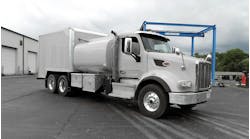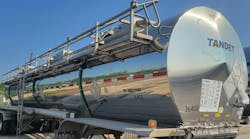THOSE of us in the trade association business sometimes wonder: “What will we do if there are no real issues in our industry? Will our members still support their trade association representatives in Washington?”
Thanks to the Obama Administration, Congress, and a recovering economy, our industry's issue plate is full. We will all need to work together to keep the industry safe, secure, productive, and perhaps even profitable.
Let's start with some good news. The first four months of this year have seen a slow but steady increase in chemical shipments. One month's uptick might be an anomaly, but four months indicates that our customers' customers are getting ready to produce things again. It is an old but true adage that the tank truck industry is among the first segments of the trucking industry to see a recession coming and the first to see one easing. We like building inventories rather than watching them drip away.
In fact, we are starting to hear from carrier members who are experiencing a shortage of drivers and even of equipment as demand increases. The “shooting fish in a barrel” rate structure our shippers have enjoyed the last two years might actually be starting to improve for the fish. Of course, an increase in chemical shipments will mean more tank trailer cleanings, hopefully, followed soon by growing tank trailer equipment order boards.
The news is not so good for our cement and dry bulk sector as all of the “shovel ready” projects the stimulus was going to spur seem to require little more than a garden spade. Let's hope that the hot air and dollars generated in Washington DC soon will turn to concrete and asphalt on our nation's tired highways and bridges. We do hear that those dry bulk carriers that support the oilfields are seeing more demand. Who knows what the terrible Gulf of Mexico oil release and $4 a gallon gasoline will do to stimulate looking for oil the old fashioned way — in the ground?
On the regulatory side, issues impacting the various segments of the tank truck industry grew faster than the weeds on my lawn over the past few months. “Wetlines” has been quiet but will soon erupt again like the volcanoes in Iceland. The House of Representatives Transportation and Infrastructure Committee continues to vilify and attack the committed safety professionals at the Pipeline and Hazardous Materials Safety Administration (PHMSA). Among the weapons on that cabal's scorched earth ambush is wetlines.
Thanks to the efforts of NTTC members who came to Washington to appear before Congress and many “letters from the folks back home,” we have thus far been able to make a very bad bill less onerous. I do not think we will see “wetlines” legislation pass the Congress this year. However, PHMSA will issue a proposed wetlines ban regulation sometime this fall. I do not believe the agency is convinced such a regulation is needed, but I understand why they are acting in “self-defense.”
Continued to Page 2
For those of you who have been reading Bulk Transporter since back in the days when I served as editor of this essential publication, you will remember the Safe Food Transportation Act of 1990. Congress ordered the federal government to strictly regulate the transportation of food products in tank trucks. The Department of Transportation (DOT) did develop a regulatory proposal, but it was never implemented. On April 30, the Food and Drug Administration issued a proposal to develop Implementation of the Sanitary Food Transportation Act of 2005. This is essentially old wine in a new bottle. NTTC will form a committee of food haulers to develop comments which are due on August 30. FDA will act where DOT did not.
As those of you who operate or ship by fiberglass reinforced plastic (FRP) trailers already know, DOT is taking a hard look at this useful and proven tool following an incident where an FRP trailer split open in transit. DOT plans to hold a meeting in Washington for all parties interested in FRP trailers later this year. NTTC will be there.
The Transportation Security Administration will continue to focus on tank truck transportation, and other agencies such as the Environmental Protection Agency and Occupational Safety and Health Administration have been emboldened by the Obama Administration and Reid-Pelosi Congress. Tank truck hazardous materials carriers will have to meet tougher standards in CSA2010 which will, once implemented, surely prove that ours is the safest segment of the trucking industry. DOT also will continue to address rollovers and tank truck loading and unloading issues.
So, I do not think your NTTC staff will need to spend much effort looking for issues. What we do need is to continue to grow the association that represents the entire tank truck industry. Our current members carry the load for everyone reading these words. If you have never been asked to join these carriers and our associate members, please consider this a Personal Invitation. Visit our website at www.tanktruck.org or call us at 703/838-1960. Let the Good Times Roll.
Conley is president of National Tank Truck Carriers Inc.
Agree or disagree? Make your voice heard by visiting Bulk Transporter Interactive at bulktransporter.com and clicking on “Contact Us.”








